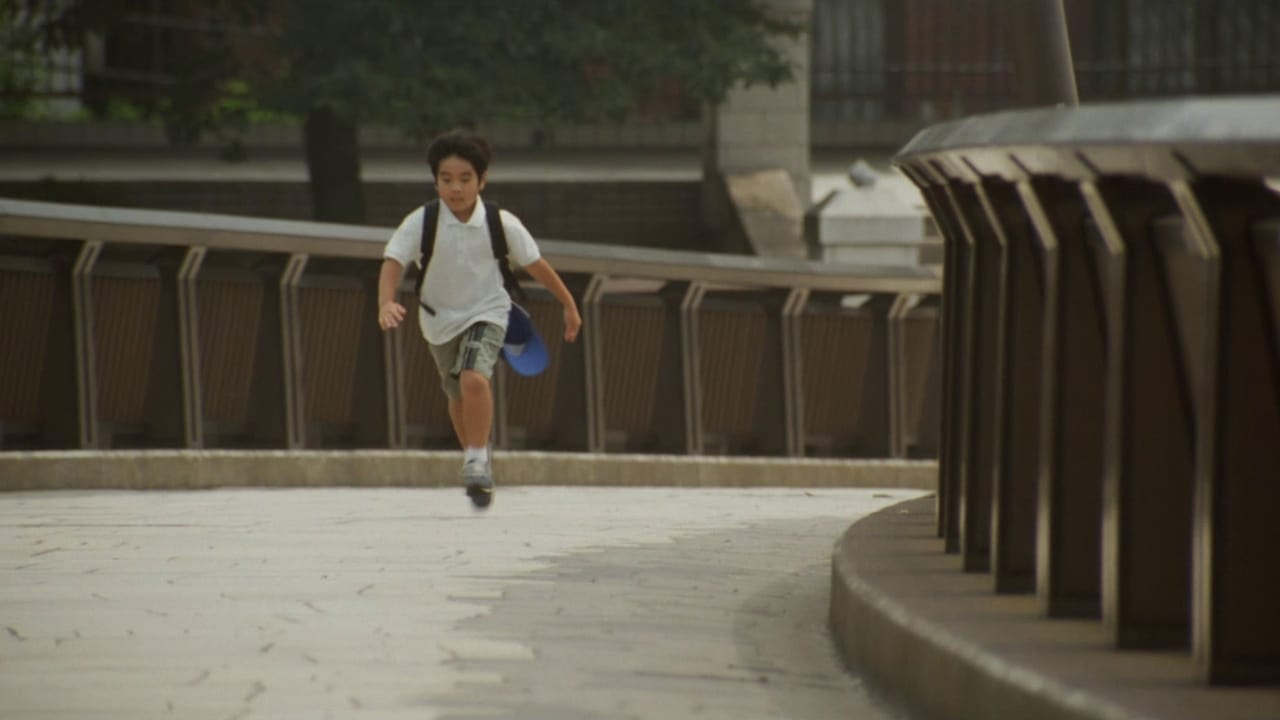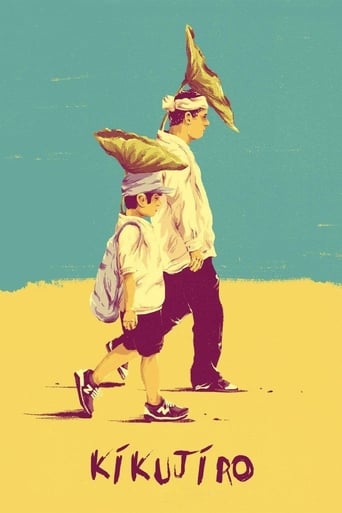Bluebell Alcock
Ok... Let's be honest. It cannot be the best movie but is quite enjoyable. The movie has the potential to develop a great plot for future movies
Sarita Rafferty
There are moments that feel comical, some horrific, and some downright inspiring but the tonal shifts hardly matter as the end results come to a film that's perfect for this time.
Darin
One of the film's great tricks is that, for a time, you think it will go down a rabbit hole of unrealistic glorification.
Francene Odetta
It's simply great fun, a winsome film and an occasionally over-the-top luxury fantasy that never flags.
rooprect
The director/star/editor of "Kikujiro" (Takeshi Kitano) began with stage comedy, then became known for his hyper-violent (yet hypnotically artistic) gangster films, and is now known as a modern master of art cinema. As the story goes, some time in the late 1990s Kitano suffered a near-death motorcycle accident, and immediately following it he made this film... which many fans call his best.His style is very photographic, meaning each shot is composed carefully like something you'd see on the wall of an art gallery. As such, he doesn't rely too heavily on motion or dialogue, and the effect can be both powerful and hilarious. If "a picture is worth a 1000 words", Takeshi Kitano milks every last syllable."Kikujiro" is a beautifully wicked road movie about a cute little kid looking for his momma. What gives it an edge is the fact that the kid gets paired up with the most unlikely "guardian" the world has ever known. Takeshi Kitano plays the guardian: a loud-mouthed, selfish, good-for-nothing troublemaker who decides to exploit the kid for all he's worth. You learn quickly that this is NOT a cutesy Disney flick. Instead, it's an edgy, slightly dark, yet thoroughly charming story about innocence in a not-so-innocent world. I could go on for ages about the clever symbolism and poetic themes, the complexity of Takeshi Kitano's character, the power of the film's final scene... but that's for you to figure out when you watch it, and on your 2nd, 3rd or 4th watch (I've seen this movie half a dozen times myself, and I can't wait to see it again).The comedy is very quirky, and not everyone will get it. But if you do, you'll be howling in the aisles. It's somewhat surreal, and most of the humor stems from the idea that Kitano's character is so preposterous, and his actions so unrealistic, that you can't help but say WTF. It's even funnier if you realize that Japanese society is quite conservative, and the situations depicted in the movie would be downright scandalous. In that respect it could almost be classed as a surrealist comedy, alongside "Airplane!" and the "Naked Gun" movies. This may be a stretch, but I'd also compare it to the mockumentary masterpiece "This is Spinal Tap", or some of the other great Christopher Guest films.One last thing I have to mention: The musical score is AMAZING. I've never heard an original score fit a film so perfectly as this. Composed by the great Joe Hisaishi, master of a thousand styles, the music for "Kikujiro" is simple, childlike and majestic at the same time. It's even more uplifting than the "Amelie" soundtrack.The music, the photography, the gags and the story make this one of my favorite films of all time... definitely one I keep coming back to whenever I need a boost.
Rokurota Makabe
This is the first film that Takeshi Kitano directed after the critically acclaimed "Hana-bi" and it represents a totally different approach from him. Perhaps he wanted to make a movie that didn't have the violent content that characterized his previous work, also trying to prove his versatility as an actor. The result is a film that manages to be funny and touching in the same time and it accomplishes that without relying on the clichés that are usually present in films of this kind.Little boy Masao decides to go on a long trip in order to visit his mother whom he had never seen, but in order to do that he must be accompanied by an adult. He finds his companion in Kikujiro, a grumpy and loudmouthed middle-aged man who sometimes cannot avoid getting into trouble. They embark on a journey that is filled with adventures, adventures that manage to build a strong relationship between the two characters. Takeshi Kitano rose to fame as a comedian and this is a film where he fully displays his comedic skills. In spite of all his bad habits, Kikujiro is a likable character and that is the merit of Kitano, who proves once again that he is a talented actor. His directing is also precise and he makes great use of the wonderful score from Joe Hisaishi.With "Kikujiro", Kitano started from a formula that you can also find in Hollywood movies (that of two very different people traveling together), but the final result doesn't look like anything from Hollywood. Kitano managed to make a highly original film by using his unique style and that really paid off in the end.My rating: 8/10
pixelsdie
I think Kikujiro is mainly about loneliness.Takeshi's character and the boy, Masao, seem really different on the surface. Takeshi's provokes people, is loud and rude. Masao is quiet and sad.But they're really the same person: someone whose life is full of disappointment, abandonment. They both feel isolated, like no one could understand. They might be pitied, but no one could understand like they'd been there, like they'd lived that kind of life.And when you get really lonely like that, I think it makes you bitter. The whole world continues to smile and sing its fortunes while your life seems to get worse and worse, less and less reason to stay living.Masao is very withdrawn because of this. Over time, as he gets older, I can see him getting more and more bitter about it. Maybe Takeshi's character was like Masao at first, too. Lonely and sad. And then maybe he thought, "why should I be sad? All the world has brought me is misfortune. I should rather be angry!" and then started trying to provoke and anger people on purpose. Why should they be content, anyway? But, all the other characters they meet on the journey are like that, too. Isolates, people on the edge of society, people who might call themselves "countercultural" or something like that. What I think is really important is how they change over the course of the movie. Like they might have the liberty to sit around all day, smoking and brooding and depressed. Masao is only a child, and all this kind of disappointment is new to him.In a less realistic film maybe the characters would be, in their characteristic brooding way, like, "Eh, them's the breaks huh kid". In Kikujiro they're people. They can see how much he's like them, how much pain he's in. And they're so jaded because they're still hurting, too.So they try and cheer him up, play games with him. Show him the kind of love he never got from anyone else in his life, that they never got. And it's so touching because they, especially Takeshi's character, start to see it's not so bad, not so hopeless. That everyone loves, and everyone cries, and just because their lives have been particularly worse than others doesn't mean they can't reach out to and come to an understanding with others.The film's long takes sometimes feel kinda pointless, like they're just there because that's part of the director's style. But other times they really work, especially in the more emotional scenes. They help say more than any amount of ridiculous sad symphonic music could.And the music, which is intermittent and plays on a single theme, is really good too. It doesn't feel like some kind of deliberately tragic cliché, but still adds a great amount to the mood of the movie and helped bring me to tears at some points.Some negative reviews I've read call Kikujiro shallow or emotionally manipulative, but I can't see that at all. The whole thing is very human, and doesn't force any moral down your throat other than that, I guess, that you are not so alone. And it feels like it's coming from someone who has been alone, who has felt this incredible sadness, and also conquered it. And I think, that means more than I can really put into words.
JimmyZappa
Beat Takeshi is a talented man. Before Battle Royale, I had the chance to see this film on TV about a boy who wanted to see his father and then later befriends Beat (who is unnamed until the end of the movie) and a couple of bikers.It's very entertaining to see how a grown man and a little boy can get into such mischief. Many of the things they do make you wanna laugh, of course, but you end up getting attached to the characters. And that's where things become intensely emotional from there. Still, it's fun to see an independent film that doesn't take itself so seriously.What helps heightens the moment is the beautiful orchestrated score by Joe Hisaishi. The theme will more than likely leave you in tears by the time you have your fun adventures with Beat and Masao and see them...well, it's best to see for yourself.A stellar film and a must watch.

